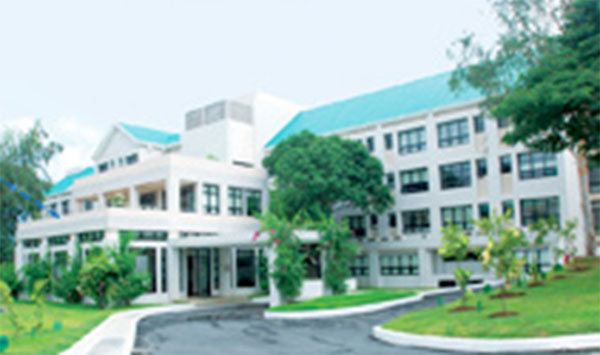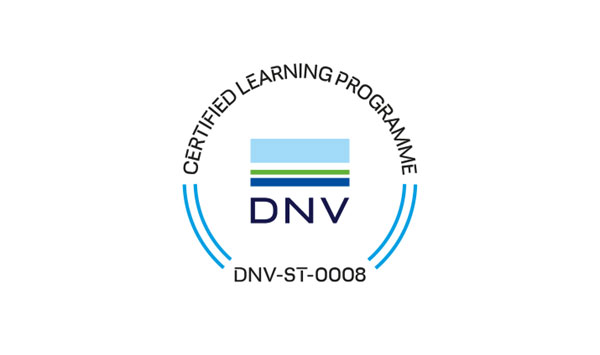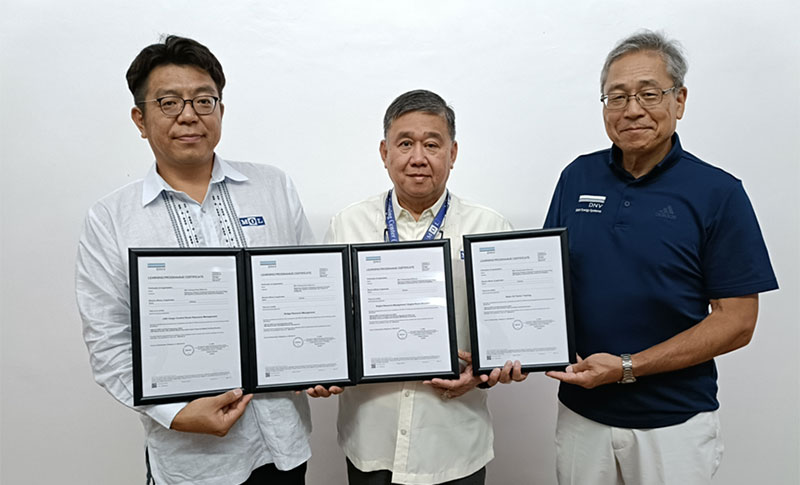- JP
- EN
Training Program for MOL Seafarers Earns 1st DNV Accreditation in the Philippines
- Achieving Safer Operations through Latest Industry-standard Courses -
August 21, 2024
TOKYO-Mitsui O.S.K. Lines Ltd. (MOL; President & CEO: Takeshi Hashimoto) today announced that on August 16, the MOL Training Center (Philis.) Inc. (President: Teodorico De Guzman; Location: Cavite, the Philippines) became the first maritime training institute in the Philippines to receive accreditation from DNV (Headquarters: Oslo), a classification society, for conforming to the latest International Maritime Organization models (Note 1) for the following four maritime training courses for seafarers onboard MOL-managed vessels.


<4 training courses obtained accreditation by DNV classification society>
- Engine-Room Resource Management (IMO Model Course7.17/2023 edition & 2.07/2017 edition) *
- Liquified Gas Cargo Control Room Resource Management (IMO Model Course 1.36/2019 edition) * (Note 2)
- Oil Tanker Training (IMO Model Course 2.06/2002 edition) *
- Bridge Resource Management (IMO Model Course 1.22/2023 edition)
* The first maritime training institute obtaining the accreditation in the Philippines.
These courses are accredited as conforming to the IMO Model Course, which means they meet the global standard required by the "Ship Inspection Report Program: SIRE 2.0," a guideline for ship inspections established by the Oil Companies International Marine Forum (OCIMF), a voluntary association of oil companies. (Note 3)
MOL has already received third-party certification for training courses at MOL Group training centers in India and Europe and plans to acquire accreditation at other locations in the future.
MOL is committed to providing seafarers with top-quality training, which contributes "to the growth and development of people and communities," one of the group's sustainability issues, while continually supporting people's everyday lives through safe operations. The group is committed to the ongoing development of competent seafarers who will support the world's highest level of safe operations, through the standardization of training content worldwide and the implementation of high-quality maritime training courses regardless of the nationality of seafarers, as a responsible leader in a social infrastructure business.

(Center) MOL Training Center (Philis.) Inc. Captain Jesus Raul C. Suarez, General Manager (Left) C/E UENO, Ken, Adviser
(Note 1) The IMO Model Course program was developed in response to proposals from IMO member countries following the adoption of the STCW Convention in 1978, and it has been revised and updated even after the 2010 Manila revision, with the latest courses being released for Engine-room Resource Management (ERM) and Bridge Resource Management (BRM) in 2023.
(Note 2) This training is based on the "Liquified Gas Cargo Control Room Resource Management" advocated by SIGTTO (The Society of International Gas Tanker and Terminal Operators). It is a training designed to utilize all available resources such as crew members, equipment, and related information in the liquified gas cargo control room, to manage and carry out safe cargo operations. Additionally, this training satisfies the simulator training standards for the operation of liquified gas tankers (IMO model course 1.36) as stipulated in the International Convention on Standards of Training, Certification and Watchkeeping for Seafarers (STCW Code), which pertains to the training and certification of seafarers and watchkeeping standards.
(Note 3) In SIRE 2.0, Pre-Inspection Questionnaire (PIQ) Chapter 3-3, each training program required for crewmembers is described to be in accordance with each IMO Model Course, and all training content in MOL training centers meets the same standard.
MOL Group 5 Sustainability Issues
MOL Group identifies "Sustainability Issues" (Materiality) as our key issues for sustainable growth with society through realization of the Group Vision.
We anticipate this initiative to contribute especially to the realization of "Safety & Value -Provide added value through safe transportation and our social infrastructure business-" and "Human & Community -Contributing to the growth and development of people and communities-."

